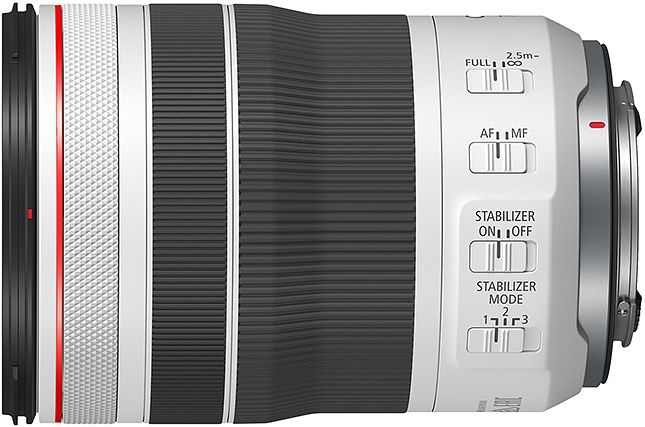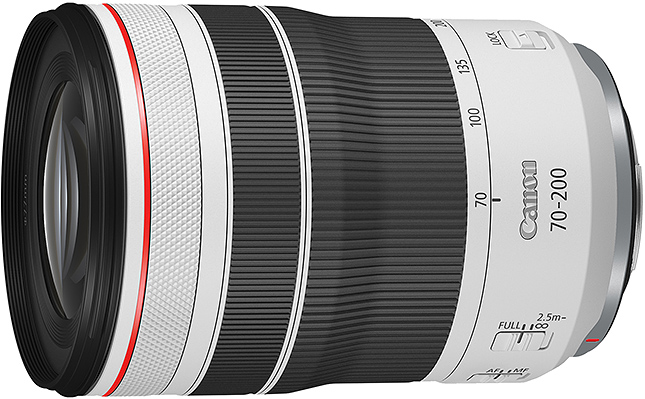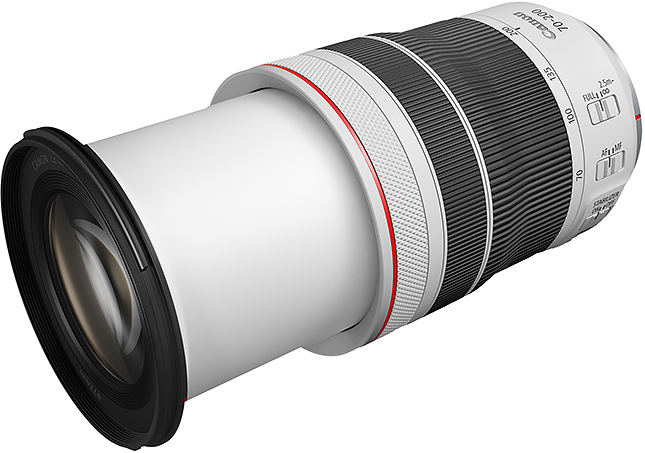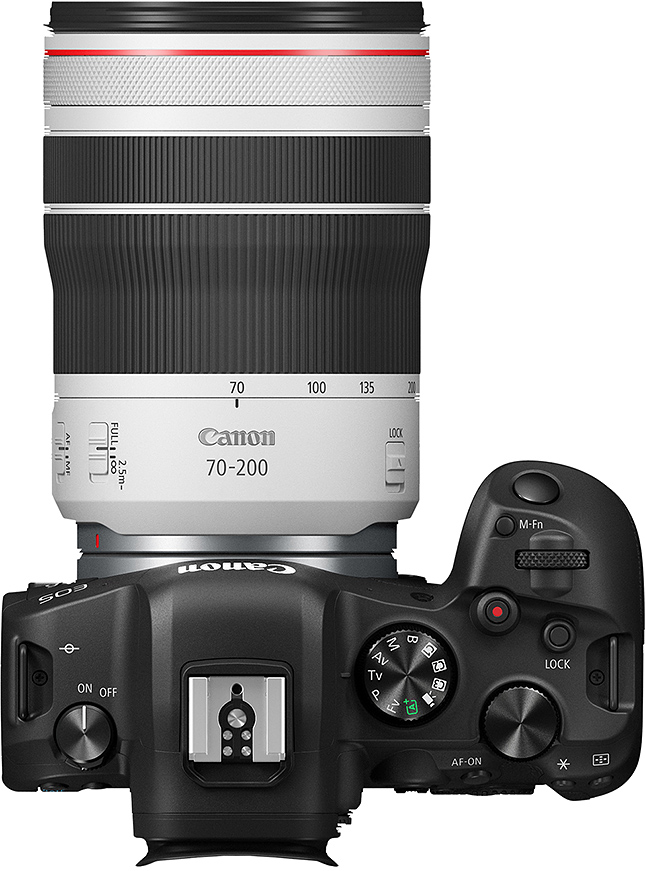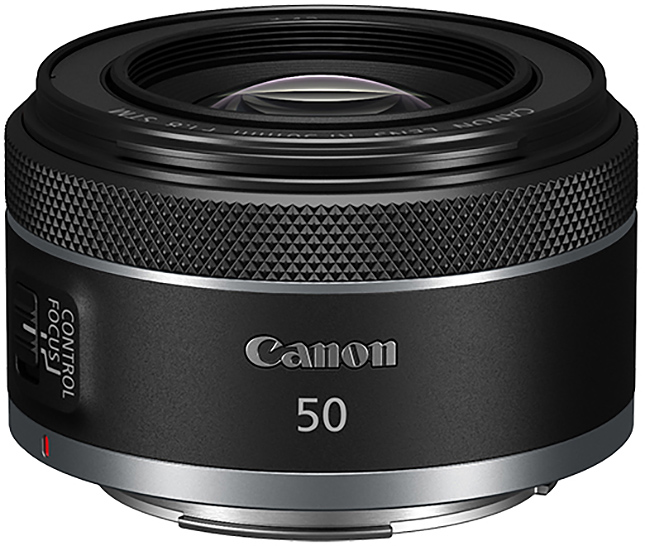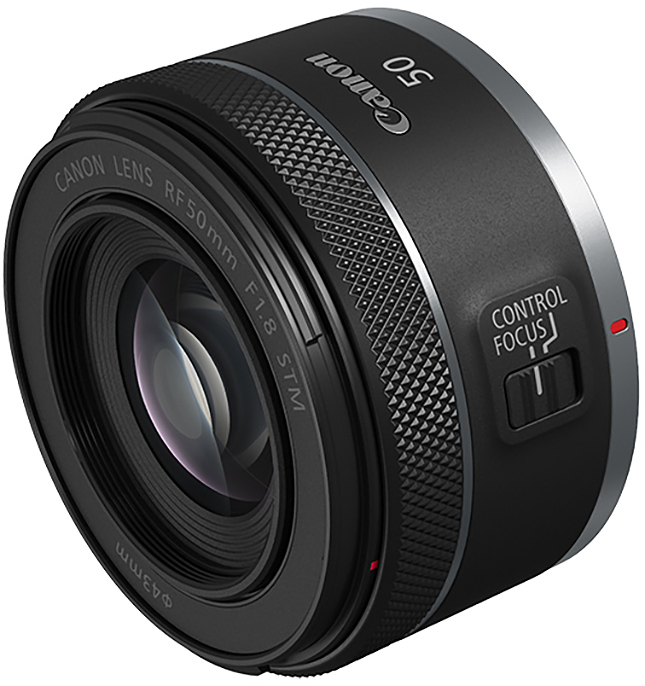Canon announces RF 70-200mm f/4L IS, RF 50mm f/1.8 lenses and Pixma PRO-200 photo printer
posted Wednesday, November 4, 2020 at 12:00 AM EDT
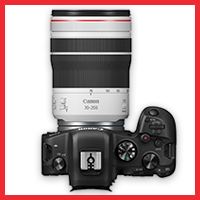
As one would expect, Canon continues to expand and grow its new RF camera system, today adding a couple more RF-mount lenses to its arsenal: the RF 70-200mm f/4L IS and the RF 50mm f/1.8 STM. Similar to their EF lens family, the RF lens lineup now features two choices for 70-200mm telephoto zoom, a faster f/2.8 option or a lighter, more portable f/4 version (there are also non-IS versions on the EF-mount side, to be fair). Similarly, EOS R-series shooters now have a choice of fast 50mm prime lenses, a pricey and extremely fast 50mm f/1.2L lens or a super-compact, affordable 50mm f/1.8. Indeed, there's now a "nifty-fifty" for Canon R-series mirrorless bodies!
Alongside the two new lenses, Canon's printer department has also unveiled a new prosumer-level photo printer. The new Canon Pixma PRO-200 is aimed at advanced amateurs and prosumer users looking to step-up their printing game, with higher-quality and larger print sizes.
Canon RF 70-200mm f/4L IS USM
For those wanting a classic walkaround telephoto lens but not necessarily needing an f/2.8-sized lens or want the extra expense, the new RF 70-200mm f/4L IS could be just the ticket. While the earlier RF 70-200mm f/2.8L IS is already small and light compared to its EF-mount companion, it's still a fairly hefty lens, weighing in at 2.36 lbs. (1070g). Meanwhile, the new RF 70-200mm f/4L IS is surprisingly compact, measuring significantly smaller than the EF counterpart.
The lens is nearly the same size as the RF 24-105mm f/4L IS lens, which is rather impressive. In fact, the RF 70-200mm f/4L IS is Canon's shortest and lightest 70-200mm f/4 lens; it's approximately 32% shorter and 11% lighter than the EF 70-200mm f/4. Plus, thanks to the new RF mount design, the optical layout is arranged such that a lot of the glass elements are pushed back closer to the camera body, allowing for more balanced handling.
Given this smaller size and new optical layout, the RF 70-200mm f/4L IS -- much like the RF 70-200mm f/2.8 -- uses a telescoping design, whereas the EF equivalent 70-200mm lenses all had an internally-zooming design. In other words, an internal barrel of the lens extends while you zoom. Despite this, however, Canon states that the RF 70-200mm f/4L IS lens is still thoroughly weather-sealed like other L-series lenses and also includes fluorine coatings to help keep dust, oil and water from the lens elements.
When it comes to the finer details of the lens' optical layout, the new RF 70-200mm f/4L IS uses 16 total elements placed into 11 groups and includes 4 UD lens elements to combat chromatic aberrations and incorporates Canon's Air-Sphere Coating to suppress flare and ghosting. Considering the RF-specific optical layout of the lens, it's important to point out that unlike the EF-mount versions, the RF 70-200mm f/4L IS (and the f/2.8 version) is not compatible with Canon's RF teleconverters, as there is no room on the rear of the lens to fit the extenders.
Additional features include a dual Nano USM-based focusing system, which uses two independent focusing motors that should provide both fast AF speeds for stills as well as quiet and smooth focus for video recording. Canon also states that the lens features minimal focus breathing thanks to the floating focus control. Further, this also helps provide better close-focusing performance, with the 70-200mm f/4 lens capable of focusing down to 1.96 ft. (59.7cm) and offering a 0.28x magnification ratio. The lens also features a customizable control ring like other RF-mount lenses and uses a 77mm filter thread size.
As the name suggests, the RF 70-200mm f/4L IS also features onboard optical image stabilization. On its own, Canon claims that the lens provides up to an impressive five stops of stabilization. However, when used in combination with the EOS R5 or EOS R6 camera bodies with in-body I.S., the pair will allow for up to 7.5 stops of correction.
The RF 70-200mm f/4L IS is scheduled to go on sale in early-to-mid December with a retail price of US$1599.
Canon RF 50mm f/1.8 STM
The second 50mm prime of the RF-mount family sits squarely on the opposite side of the price spectrum. While the earlier RF 50mm f/1.2L lens comes in a whopping US$2299 and weighs a hefty 2.09 lbs (950g), the just-announced RF 50mm f/1.8 STM is a classic "nifty-fifty" in many ways. Priced at just $199 and weighing only 0.35 lbs (160g), this new RF 50mm lens is a budget-friendly and ultra-portable prime for Canon shooters looking for an affordable, compact lens for portraits, low-light shooting and all-around general photography subjects. It'll be an excellent pairing to a small R-series camera like the EOS RP.
The RF 50mm f/1.8 uses just 6 optical elements in 5 groups and includes a single aspherical element. The PMo (precision molded) aspherical lens helps suppress chromatic aberration and the optical design as well as the use of Canon's Super Spectra Coating (SSC) help reduce ghosting and flare. The lens uses a 7-bladed aperture diaphragm for pleasing, smooth background blur and good subject isolation. The 50mm f/1.8 lens offers a 0.25x magnification ratio and a close-focusing distance of 0.98 ft. (30cm). The lens sports a small 43mm filter ring size.
Like other RF lenses, the 50mm f/1.8 also includes the customizable control ring, which also doubles as the lens's focusing ring when you flip the side AF/MF switch. In AF modes, it can be programmed for various exposure setting adjustments, such as ISO, Aperture or Exposure Compensation. As the name indicates, the new RF 50mm f/1.8 uses a stepping motor (STM) for its autofocusing system. The gear-time SRM motor is said to provide smooth and quiet AF performance for both stills and video.
The RF 50mm f/1.8 does not include optical image stabilization. However, when used on an IBIS-supporting EOS R-series body, the combination is CIPA-rated for up to 7 stops of stabilization.
Like the 70-200mm, the new RF 50mm f/1.8 STM is slated hit stores in early-to-mid December with a retail price of US$199.
Canon Pixma PRO-200 Printer
Last up, we have a brand-new advanced amateur-focused photo printer, the Pixma PRO-200. Serving as a successor to the PRO-100 printer, the new printer is about 15% smaller in its overall footprint yet still provides large photo printing up to 13 x 19 inches. The new PRO-200 uses an improved 8-color ChromaLife 100+ dye-based ink system, offering enhanced color gamut for magenta, red and blue inks as well as higher black density for even deeper, richer blacks. The printer is also stated to offer increased dark color preproduction for reds and blues. Much like Canon's characteristically rich reds from their camera files, the new PRO-200 is said to offer more vibrant reds. Canon states, too, that the improved color reproduction works well for both glossy and matte print papers.
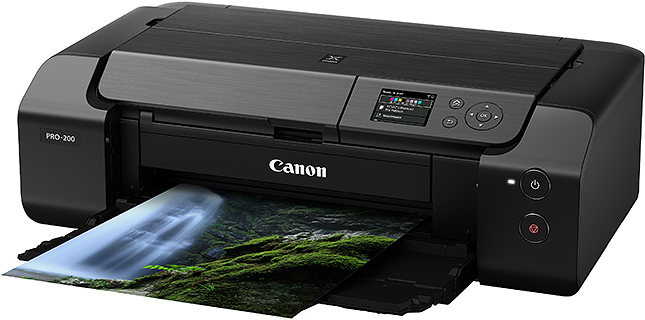
The Pixma PRO-200 supports both top tray paper feeding and a manual feed tray, and now also includes a new Skew Correction feature that automatically corrects any shifts in the paper during printing. In addition to standard prints up to 13 x 19 inches, the PRO-200 also allows for longer aspect-ratio prints than the predecessor model, including panoramas up to 23.4 x 8.3 inches and longer user-defined sizes up to 39 inches. The new model supports a wide variety of print media, including Canon's Photo Paper Pro Luster and newer Premium Fine Art Rough paper.
The printer features a new 3.0-inch LCD panel for easier operation and monitoring of networking and ink supply. Users can now connect the printer to their wireless network using the on-board LCD screen rather than having to set it up via their computer. The PRO-200 supports both 2.4Ghz and 5Ghz Wi-Fi as well as an ethernet connection. The PRO-200 supports Canon's Professional Print and Layout Software software, which can be used either as a standalone application or as a plugin within Adobe Photoshop and Lightroom.
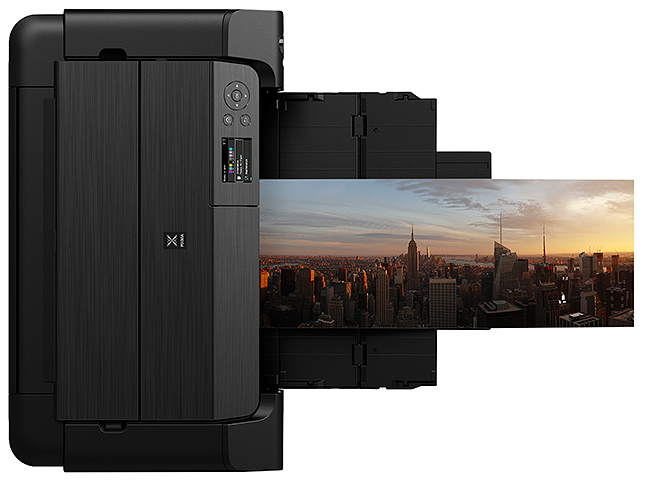
The Pixma PRO-200 uses an all-new ink system, 12.6mL CLI-65 cartridges, which Canon states cost about $13.99 each.
The Canon Pixma PRO-200 printer is scheduled to go on sale later this month for a suggested retail price of $599.99.
